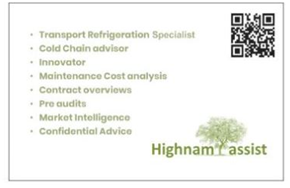There are no hazy shades this winter the figures are clear for the Transport Refrigeration Sector, the future is looking increasingly naturally electrifying...

The author: Norman Highnam MinstR
The article from TCS&D Dec/Jan 2023 (epublish4me.com)
The clocks have fallen back and the dark nights and dark mornings are here for all of us.
But as we also see the temperature falling and the sunlight weak with little warm, we can as least have some comfort that the companies who do operate transport refrigeration equipment will be seeing a reduced run time, as the units do not need to wrestle internal and external factors to the extent that they would do in the summer months to maintain their critical load temperatures.
As 2023 is fast approaching alongside another Government funded 3year review of the transport refrigeration unit sector via the Department of Transport in conjunction with the team at Zemo Partnership (a independent non-profit partnership),we need to reflect on other key events, facts and figures that we have seen or have been talking about in the last year or so in the UK and internationally.
Red Diesel – The use of red diesel in the transport refrigeration sector was bannedas of the 1st April 2022. This ended the Non Road Mobile Machinery exemption from paying the full price for the fuel used to power most transport refrigeration units with the aim to give companies the incentive to look to replace older equipment, with newer greener technology.
California Air Resource Board – Announces the entry into state law for the transitional phase out of all diesel transport refrigeration units fitted to trucks starting in 2023 with a total ban by 2030. With confirmation on further talks to start the process on all diesel transport refrigeration units fitted to trailers, starting with unit age related emission reduction controls. The emission controls set out by the Californian team have also been adopted by a number of other USA states.
USA Congress Clean Air Act – Also previously known as FREEZE Act. This in simple terms confirms the federal USA Government is taking progressive and direct action to address emission issues not limited to, but stating transport refrigeration as part of the cause of high emissions in the USA. It’sthe usual long political journey, but its outcome will give focus to the future type of transport refrigeration units in the USA.
Electric Innovations – This has been a very active sector with numerous case studies released on the benefits of e- Axles - active air curtains -truck engine mounted generators including regeneration braking systems - trailer and truck mounted solar panels – battery packs big and small and electric only units fitted to trucks and trailers to the introduction of smart shorepower sockets to monitor and control diesel usage vs electric.
Refrigerant gas innovation – We have welcomed the introduction to the transport refrigeration market of light commercial and trucks refrigeration units running on Natural Refrigerants only in the EU and the UK. At the same time, we have seen more and more international regulatory and government awareness of the use of synthetic refrigerants that have a high Global Warming Potential like HFC R452A – R404A etc and the newer synthetic HFO used in gases like R1234y –R454A. With an increased focus on accelerating a phase out of non-natural refrigerants in the EU and USA, and with increasing legal challenges being documented about the use of PFAS chemical ( forever chemicals) which are found in the HFC- HFO chemical compositions.
PCM – Phase Change Materials a little known but growing area in the transport refrigeration sector, but one that is making changes in the eCargo and small box final mile delivery sector, this is an area that fits nicely into systems that require little power and less weight and are looking for that All Green Tech etc.
-
The USA CARB Health report 2019 indicates that, by implementing there proposal to reduce transport refrigeration emissions,they will between 2021 and 2030 save the state a total valuation of $3,993,405,956and save numerous lives of people working in the industry and working around the industry.
-
The Transport Scotland Report compiled by Zemo Partnership on the emissions from transport refrigeration units found that 1 diesel transport refrigeration unit ( excluding refrigerant gas emissions) emitted about the same as 500 Euro 6 trucks on certain emissions. As we have no actual figure for the amount of transport refrigeration units in the UK there have been estimates of 50,000 diesel type transport refrigeration trailer units in the UK and add about another 20,000 diesel truck type refrigeration units in the UK then we can estimate that we have around 35,000,000 more EURO6 trucks on the road. Interesting as the RAC Foundation states the we only have about 540,000 licenced HGV’s units up to March 2022 of various EURO standards.
My take away
Firstly, the CARB emission regulation takes a bite at the emission problem in the sector but has not addressed the use of synthetic refrigerants – (1 Kilo loss of R452A refrigerant based on BOC Gases figures is 2141kg Co2e). However, they are way ahead of the UK and the EU in terms of diesel transport unit emissions regulatory approach.
We also need to consider that there are about 30,000 light commercial transport refrigeration units that will hold c45,000kg (96,345,000kgCo2e) of HFC R452A – R134A gases in the UK alone with a high leak probability compared to their bigger cousins the truck and trailer units, I feel that we need to include these in the HFC-HFO FGAS inspections annually.
The need to re-calculate the actual emissions from freight transport is needed and to include the transport refrigeration unit diesel and refrigerant gas emissions together and then consider how DEFRA test’s the emissions and when. Then the UK Government should use that figure to gauge reductions in freight emissions and also then to make the health of the workers in the industry and the public who live near the industry etc a key factor to improve and secure their quality of life.
“Thinking of the box” I am convinced this will be a constructive and innovative way to introduce effective emission control and reductions to allow our sector to be “Together in Electric Dreams” and to become leaders in the Global Transport Refrigeration Cold Chain sector.
We are tiptoeing, in areas where we need to stamp our mark for the good of all.
About Norman Highnam MinstR
A leadership awarding winning and published transport refrigeration consultant having spent over 35 years in the industry at all levels from engineering to senior board level appointments.
I look to help people understand the industry and I actively lobby for engineer safety including the removal and control of emissions in the transport refrigeration sector.
